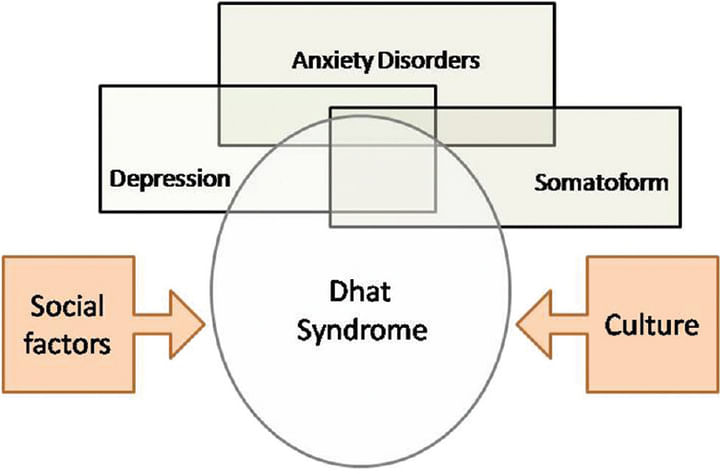Psychological Distress And Anxiety Related To Semen-Loss / Masturbation
The term ‘Dhat syndrome’ was first described by Dr. N.N. Wig in a 1960 issue of the (Indian) Journal of Clinical and Social Psychiatry, and then by Dr. J.S. Neki in the British Journal of Psychiatry (1973). According to a short paper by Dr. Om Prakash in the Indian Journal of Psychiatry, dhat syndrome comprises various psychological, somatic and sexual symptoms attributed by the patient to the passing of whitish fluid, believed to be semen in urine (i.e., psychological distress and anxiety related to semen-loss). Prakash says that the word ‘dhat’ is derived from the Sanskrit word ‘dhatu’ (which has multiple meanings including ‘metal’, ‘elixir’ and ‘constituent part of the body’). He also noted that:
- “This notion of seminal loss frightens the individual into developing a sense of doom if a single drop of semen is lost, thereby producing a series of somatic symptoms…fear of semen loss and resulting problems [in India] is so strong that cures are advertised by vaids and hakims everywhere – on walls, on television, in newspapers and on roadside hoardings”.
- The anxiety surrounding the semen loss can also relate to the releasing of semen via nocturnal emissions (i.e., ‘wet dreams’) and masturbation. The symptoms include fatigue, listlessness, appetite loss, lack of physical strength, poor concentration, forgetfulness, guilt, and (in some cases) sexual dysfunction. Given the syndrome relates to psychological anxiety surrounding semen loss, the disorder is (necessarily) found among men, but interestingly, the dhat syndrome has also been applied to women who experience similar symptoms relating to white vaginal discharge). According to an online article on CBSs, it claims that:
- “The anxiety related to semen loss can be traced back thousands of years to Ayurvedic texts, where the loss of a single drop of semen, the most precious body fluid, could destabilize the entire body”.
Another study reported that 93 (out of 144) consecutive patients attending a sexual dysfunction clinic had dhat syndrome. A number of papers published on the dhat syndrome in the 1980s and 1990s all report that depressive, anxiety and/or somatoform disorders are prevalent in the majority of dhat sufferers. A small study reported that ‘semen loss’ was seen by most of the men as the main reason for their sexual dysfunction. The same study reported that 40% of the sample had hypochondriasis.
- Dhat alone (where their symptoms are attributed to semen loss, and with presenting symptoms that are hypochondriacal, depressive or anxiety-related in nature)
- Dhat with comorbid depression and anxiety (where dhat is seen as a symptom accompanying another disorder)
- Dhat with sexual dysfunction
- The duration of the symptoms can be relatively short-lived (e.g., 3-12 months) but some papers report people suffering for up to 20 years. The most common co-morbid disorders and sexual dysfunctions associated with dhat. This included depressive neurosis (40%-42%), anxiety neurosis (21%-38%), somatoform and hypochondriasis (32%-40%), erectile dysfunction (22%-62%), and premature ejaculation (22%-44%). It is also reported that the majority (i.e., two-thirds) of dhat sufferers recover (66%), with the remainder either improved (22%) or unchanged (12%). Dhat beliefs are often based on misconception and myths:
“These myths and misconceptions which are deeply rooted in Indian culture are passed from generation to generation. Due to the lack of proper information and lack of open communication between parents and children, the only source of knowledge for many remain their peers, who are equally ignorant about the subject, and this leads to widespread misconceptions. Many people consult unqualified practitioners who reinforce their ignorance”



+1.svg)
